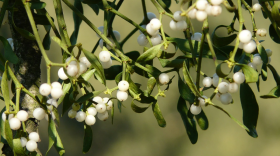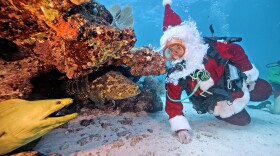Archeologists have found spear points in association with bison remains at Paleo-indian sites in Florida. They estimate they were hunted and killed about 12,000 years ago. Now bison are back on the Florida landscape, transported here and reproducing on range-land formerly used for cattle. The largest herd of bison, about 2,500, roams at Three Sun Ranch just east of Punta Gorda.
The ranch was bought by Keith Mann and other family members about a year ago. Its 5,700 acres are crisscrossed by dirt trails. Surveying the range in an SUV, from a distance the bison herd looks like hillocks on the flat green horizon. Then the animals come into focus.
“They’re not intimidatingly large”, Mann said. “They’re not any bigger than a beef cow here in South Florida.”

Mann has hired local cowboys to handle the bison, which are quickly adapting to the climate, shedding their shaggy coats, in addition to mass.
Unlike most beef cows raised in Florida, these bison will spend their entire lives here, grazing on grass until they’re considered “finished” or ready for slaughter. Florida’s beef cows are usually transported to other states and fattened up on corn before they’re processed. Mann, instead, is focused on improving the quality of his grass, trying to reproduce what was done in nature several hundred years ago.
“They’d come into an area and annihilate everything”, he said. “They’d eat what they liked, trample what they didn’t and their droppings and urine would regenerate the grass before they returned.”
As for feeding corn to bison, Mann eschews it. He’s adopted the increasingly popular Paleo diet and he’s raising his bison to appeal to the appetites of other folks who also embrace this way of eating.
“Paleo is short for paleolithic,” Mann said. “It’s a throwback to how cave men would eat, a lot of fruits, vegetables, meats, nuts and berries; so no grains, no dairy.”
There’s some data in support of the Paleo- diet. A study from Ohio State University found Plains Indians, who subsisted on bison, berries and other native plants, were the tallest and presumably healthiest people in the world - prior to contact with Europeans.

Mann is new to ranching, but he’s spent the last year learning; attending lectures, seminars and workshops. He’s set up a handling system inspired by well- known cattle behaviorist Dr. Temple Grandin.
“They’ll come through a series of winding tunnels and it continually gets to a smaller space until we get to the end and it’s a single file line,” he said. “So they’re being channelized very slowly so that they’re not aware of it until they’re single file and then we can sort them and check them for health.”
A processing facility, where the bison will be slaughtered and packaged, will soon open at Three Suns. This will spare the animals the stress of being loaded into trucks and transported. Mann said stress impacts the meat’s quality.
All this is well and good, said Dr. Geoffrey Dahl of the University of Florida, where he’s chair of the Department of Animal Sciences. But he said there’s a reason why farmers and ranchers began fattening cattle for slaughter with corn and other grains about 150 years ago.
“People tend to prefer it, they’re not used to a corn fed or grain finished animal,” Dahl said. “And because you are going to get somewhat higher fat content in it and that’s going to provide a better mouth feel and a better taste in a lot of people’s opinion.”
Dahl said this has been borne out in blind taste tests.
In a test of T-bone steaks from bison raised on the ranch, the cooked product, medium rare, was deemed “rather tasty, but chewy.”
But Keith Mann is banking on tastes changing, with consumers demanding minimally processed foods with a mind to the health benefits he said come with them.








